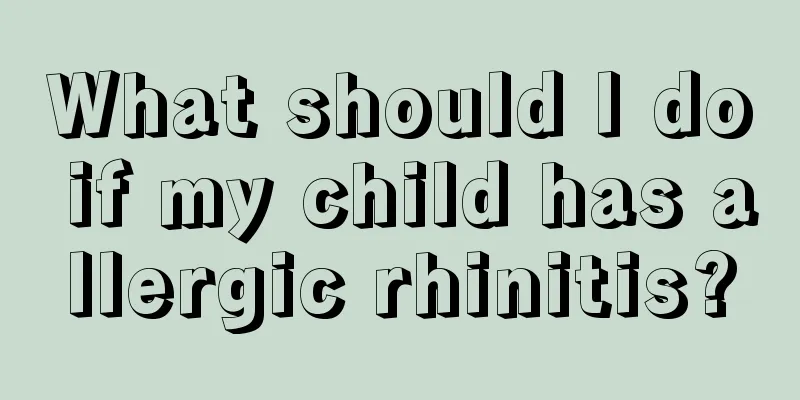What should I do if my baby spits up milk seriously at two months old?

|
Babies are a group we pay close attention to. We often pay attention to their health and their lives, but we also need to pay attention to some of their daily lives. It is very important to pay more attention to their physical health. In daily life, it is very important to observe the baby's life phenomena more and pay attention to some small details in their lives. Vomiting is a common phenomenon in newborns. The stomach of a newborn is in a horizontal position and has a small capacity. The stomach muscles are weak and the functions are not yet complete, making it easy for the baby to vomit. Vomiting may be a physiological phenomenon, a pathological phenomenon, or even an early manifestation of some serious diseases. Therefore, it is very important to promptly and normally determine the cause of vomiting and take appropriate measures. First of all, we need to figure out whether the baby is spitting up milk or spitting up milk. The two have different meanings, causes and treatments. The amount of spitting up is relatively large, and may occur shortly after feeding or half an hour later. Before spitting up, the child will open his mouth and stretch his neck, with an expression of pain and discomfort. The amount of milk spitting up is small and usually occurs right after a meal. It usually stops after one or two mouthfuls. Spitting up is a common phenomenon in infants. There are two reasons for this: one is that it is a symptom of systemic or gastrointestinal disease; the other is that the anatomical and physiological characteristics of the infant's gastrointestinal tract make vomiting more likely to occur. Generally speaking, vomiting caused by the second reason is more common. The milk taken in through the mouth first passes through a tube called the esophagus and then enters the stomach. The stomach has two doors, one is connected to the esophagus called the cardia, which is the entrance of the stomach, and the other is connected to the intestine called the pylorus, which is the exit of the stomach. The tension of the esophageal muscles in infants and young children is low, which can easily cause expansion. At the same time, the peristalsis is relatively slow, so food can easily accumulate. The cardia is relatively loose and not tightly closed, so it can be easily opened by food. When there is a little more food in the stomach, it can break open the cardia and flow back into the esophagus. The pylorus is tightly closed and can be easily stimulated by food to cause spasm, which makes the exit resistance greater, and food passes slowly or with difficulty. Food then flows back from the pylorus to the cardia and breaks out. In addition, the baby's stomach does not hang down like that of older children and adults, but is in a horizontal position. This can reduce the capacity of the stomach, store less food, and also make it easier for it to return to the cardia. Due to the existence of the above factors, even under normal circumstances, if you eat too much and lie down immediately after feeding, the milk can easily rush open the cardia and return to the mouth through the esophagus, causing vomiting. If a child spits up milk occasionally and is in good spirits, he or she may not be sick. If the child vomits several times in a row and vomits every time during feeding, you should pay attention to whether the child has a fever, the condition of his bowel movements, any changes in his spirit, etc. There may be problems with the gastrointestinal tract itself, or there may be lesions in other systems. You should take your child to the hospital for examination. The above is about the serious problem of two-month-old baby spitting up milk. I hope it can help everyone. In life, what we need to do is not only the health of children, but more importantly their physical problems. Paying more attention to some small details is very important for children. In life, we should observe the lives of children more, and some small problems are also very important. |
<<: What are the dietary treatments for baby runny nose?
>>: What to do if your baby's face is swollen
Recommend
How to get your baby to sleep
Right after a baby is born, he or she is not yet ...
Why is my baby's urine dark red?
Having a baby at home can be said to be a very ha...
What to do if baby's buttocks are broken
The skin of a newborn is relatively delicate, so ...
What are the symptoms of precocious puberty in children?
Precocious puberty in children has become an issu...
Indications for children's amoxicillin dry suspension
Children's amoxicillin dry suspension is a dr...
Reasons why babies sweat a lot
Many parents find that their children sweat a lot...
ADHD
ADHD is a disease that occurs more frequently in ...
Why does my baby have dry stools after eating complementary foods?
To put it simply, dry stool means that during the...
What to do if your child has a lot of phlegm and runny nose
Children of a few years old generally have poor p...
Why do 13-year-old girls have underdeveloped breasts?
Generally, girls start to develop breasts between...
What should I do if my two-year-old child has a fever of 39.5 degrees?
The reason why many babies have fever is mostly c...
Children daydreaming in class
Children often have problems with distraction and...
Will children with lead poisoning always hit their heads?
We all know that when children first learn to wri...
Chinese medicine formula for conditioning boys
Because of the imbalance of Qi and blood function...
What to do if infants and young children have heat stroke
In the hot summer, we adults always get heatstrok...









